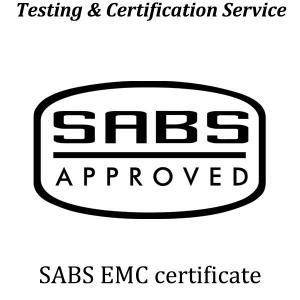

Add to Cart
Introduction to SABS Certification in South Africa
The South African Bureau of Standards (SABS) was established in
accordance with the National Standards Act promulgated in 1945 and
belongs to the South African Ministry of Trade and Industry. SABS
is a neutral third-party certification body responsible for system
certification and product certification in South Africa. In
addition to the responsibility of setting standards, SABS also
represents the national management norms and standards, and grants
the right to use logos for products that meet the norms. SABS Mark
is widely used in various fields and has become a mark of product
quality assurance.
Certificate description
SABS certification is divided into two categories: product
certification and system certification. SABS product certification
mainly includes the following eight categories: chemical products,
biological products, fiber products and clothing, mechanical
products, safety equipment, electrical products, civil and
construction, and automotive products. Among them, the construction
materials and products involved are: stone products, concrete
products, roof materials, cement, lime, cement mixtures, natural
building stones, safety glass, steel structures, wood and wood
products, bricks, tiles, paints, Coatings, sealants, etc.
Application process
1. Manufacturer completes the application form
2. If the factory has more than one factory building, you need to
fill in another application form. Every product within the scope of
certification is required to be reflected on the application form.
In addition, the factory also needs to fill out an application form
for the credibility of the person in charge who will guarantee the
first review fee and other certification fees;
3. After receiving the application form, the South African Bureau
of Standards will issue a review quotation;
4. Under the premise that the quotation is approved, the South
African Standards Bureau will conduct a factory inspection;
5. If the above review is passed, the South African Bureau of
Standards will prepare an annual supervision contract;
6. Two auditors will conduct random review every year, and the cost
of annual supervision review and test will be stated on the
contract;
7. The two auditors will take samples for inspection to the
laboratory;
8. For the samples to be tested later, the South African Standards
Bureau will draw the goods from the sellers in South Africa. If the
batches of the goods are less than 4 times a year, insufficient
samples will be sent from the factory, and the cost will be paid by
the factory bear;
9. If the test result is unqualified, then the cost of the sample
and the cost of retesting will be borne by the factory;
10. The validity of the certificate will be three years, unless the
certificate is cancelled for other reasons.
South African Certification Body
1. NRCS: It is the issuing authority of LOA certificate.
2. SABS: Issuing authority for COC certificate and SABS mark
certification. South African Bureau of Standards (SABS)
Responsible for braking South African standards, and also work on
certification and testing.
3. LOA certification: letter of Authority, for security.
4, COC certification: certificate of Compliance, for EMC.
5. SABS certification: This certification is voluntary. The
requirements are more stringent, and the South African Standards
Bureau (SABS) needs to arrange factory inspection and testing, and
there will be two annual audits after obtaining the certificate.
